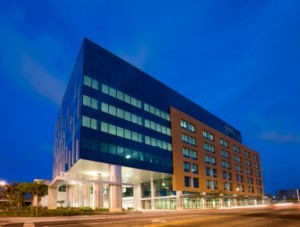Don’t look now, but the rise of Miami’s next up and coming neighborhood may be underway in the most unlikely of places. The city’s Health District, located just northwest of Downtown and southwest of Wynwood, smack dab between MIA and South Beach is heating up.
It all started with the development of Wexford Science & Technology’s University of Miami Life Science and Technology Park, which is home to a collection of restaurants and retailers along NW 7th Avenue.
Suddenly the neighborhood is in the crosshairs of real estate developers of all shapes and sizes, with a number of new projects in the works — from retail to shared workspace to a much-needed affordable housing project by Pinnacle Housing Group.
Today’s Miami Herald feature, below, has the whole story. See you in the Health District soon!
![]()
Gorgonzola pizza with white truffle oil, Chilean sea bass, imported Italian prosciutto and craft beers are run-of-the-mill fare in Miami’s trendier neighborhoods from Miami Beach to the Miami Design District. But such a trendy menu isn’t what you would expect on the edge of Overtown in the area broadly known as Miami’s Health District.
 The opening last fall of two high-profile restaurants, Balans and Thea Pizzeria and Cafe, at the University of Miami’s Life Science & Technology Park is fueling optimism that the neighborhood sandwiched between the Jackson Memorial Hospital campus and Overtown is on an upswing. Long dominated by rundown industrial and commercial buildings, the area is now slated for additional retail and residential development.
The opening last fall of two high-profile restaurants, Balans and Thea Pizzeria and Cafe, at the University of Miami’s Life Science & Technology Park is fueling optimism that the neighborhood sandwiched between the Jackson Memorial Hospital campus and Overtown is on an upswing. Long dominated by rundown industrial and commercial buildings, the area is now slated for additional retail and residential development.
The two restaurants, at 1951 NW Seventh Ave., are owned by local industry veterans with a history as pioneers in Miami’s urban neighborhoods. They say the same early indicators that brought them to Wynwood and Miami’s Upper East Side are drawing them to the Health District.
“When you go into an underserved area, there’s more pressure to make a more interesting place where people want to come,” said Thea Goldman, the owner of Thea Pizzeria. She learned the art of redevelopment for her late father-in-law Tony Goldman and opened Joey’s in Wynwood with her then-husband. “It’s fun to surprise people. They come in a little trepidatiously. There is a curious crowd that will come. They just have to be enticed. Wynwood proved that. Restaurants can ignite a neighborhood like nothing else.”
 GROWTH PLAN
GROWTH PLAN
What attracted Goldman and Balans’ owner Prady Balan to the Health District was the growth plan for UM’s research park. Both restaurants are on the ground floor of the park’s first 252,000-square-foot building, which opened in June 2011. Four additional buildings are planned for the eight-acre biotech research park. The building is currently about 75 percent leased with a mix of offices and laboratories; plans for a second building call for a mix hotel rooms and offices, which could begin construction later this year, pending a deal with UM.
The goal is to create a thriving commercial center feeding off the $200 million in research conducted annually by the nearby University of Miami Miller School of Medicine on the Jackson hospital campus.
Both restaurateurs say developer Wexford Science & Technology, which leases the land from UM and developed the first building, made deals that were attractive enough to support a long-term approach to the area.
“I knew that it was going to be highly challenging, but I was bored in life, so I thought I would do something daring,” jokes Balan, who has successful restaurants in South Beach and London and pioneered eateries on Biscayne Boulevard and Brickell Avenue. “It probably will take three years. Slowly but surely people do come over. They are liking it and becoming regulars.”
Balan figures all he needs is to attract 10 percent of the 55,000 people a day who work or visit the Jackson Memorial Hospital. Miami’s Health District is the second largest in the country, behind only Houston. To attract those customers to the restaurants at the park, Wexford offers a daily free lunch shuttle to the Jackson campus. The park also offers free valet parking or free gated parking for restaurant visitors.
In addition to the two sit-down restaurants, the building features a newly opened Subway Cafe featuring a new concept with more couches and spaces for lingering. It also houses a UPS store and Liberty Dry Cleaners.
 The retail and restaurants are amenities for the park’s office tenants. They also further Wexford’s goal of evolving the area into an identifiable destination. But make no mistake, the developer has no grandiose visions of competing with any of Miami’s more nightlife-oriented neighborhoods, said Bill Hunter, regional director of leasing for Wexford Science & Technology.
The retail and restaurants are amenities for the park’s office tenants. They also further Wexford’s goal of evolving the area into an identifiable destination. But make no mistake, the developer has no grandiose visions of competing with any of Miami’s more nightlife-oriented neighborhoods, said Bill Hunter, regional director of leasing for Wexford Science & Technology.
“I don’t think Medical District sounds like party town,” Hunter said. “The park is all about creative collisions and entrepreneurs meeting up. There is no better place to do that than over a beer at Balans, lunch at Thea or a sandwich at Subway.”
IN SPOTLIGHT
The area’s untapped potential is drawing the attention of other developers as well.
When the Melo Group got a good deal on land in the Health District area during the recession, the family-owned company built a 156-unit apartment building. Oak Plaza opened in September at 1415 N.W. 15th Ave and is already more than 80 percent leased. With monthly rental rates ranging from $1,250-$1,600, the building is attracting young professionals, many of whom work at the nearby hospital.
“We thought it would be successful because there are a lot of people working in the area who have a need for a rental building,” said Martin Melo, who owns the company with his father and brother. “But even we have been majorly surprised at the response from doctors and people who are very good tenants. They don’t want to get off at 3 a.m. and take a half hour to get home.”
Developer Michael Swerdlow plans to break ground this year on another restaurant and retail project. Current plans call for two-floors and a total of 55,000 square feet of space with a food court on the second floor. Other tenants could include sit-down restaurants, bars and service-oriented retailers such as a drugstore and dry cleaner.
“It’s what the area needs,” Swerdlow said. “There’s a lack of food in the whole area right now.”
Without any viable options, businesswoman Valerie Crawford used to go to Brickell or South Beach for lunch meetings. Now, she schedules business meetings in the park at least once or twice a month. Though she no longer runs a business in the area, Crawford is holding on to a warehouse that she plans to turn into a small business incubator as the area becomes a hub for start-ups.
“Any time you have that kind of re-gentrification, it uplifts the entire neighborhood,” said Crawford, a management consultant and chair-elect of the Miami Dade Chamber of Commerce, which has its offices in the park.
Pinnacle Housing also believes in the area’s potential. Later this year, the affordable housing developer expects to begin the first phase of a project on a five-acre property at Northwest 7th Avenue between 24th and 26th streets. Pinnacle has owned the former McArthur dairy distribution site for about six years and has zoning approval to build between 500 and 600 units of affordable housing, plus retail, representing over 1-million-square-feet of development.
“We try to build in urban infill areas where there is a strong base of employment and you can’t get any stronger base than the Health District,” said Michael Wohl, partner in Pinnacle. “We think the time is going to be right in the next several years for this part of town to expand and fulfill its destiny. We want to be part of making this a more liveable place.”
For now, that improved quality of life comes from the new restaurants.
At Thea, it’s impossible to miss the 30-foot long Italian glass mosaic mural of blooming flowers set against the cafe’s black interior. The 38 seat restaurant draws a steady lunch crowd, but Goldman is testing dinner only on Fridays. She has kept prices affordable to attract a wide-range of consumers, with all but one item on the menu priced at $16 or less for patrons that may include lawyers, artists and tow-truck drivers.
“I get customers from everywhere,” Goldman said. “There’s one great equalizer — great food.”
But at Balans, where the restaurant is well more than double the size, the crowds are hit-and-miss. For now, that restaurant has scaled back its hours from 9 a.m. to 9 p.m., staying closed most weekends.
“People have to be told to come in, it’s safe,” said Erik Poirier, general manager of Balans. The word needs to get out. ”







 See More Blogs
See More Blogs
Comments